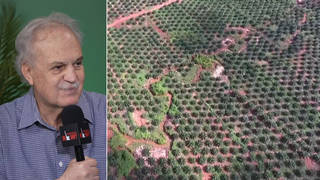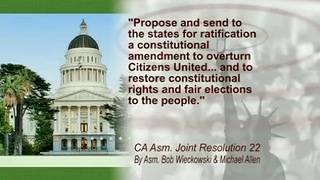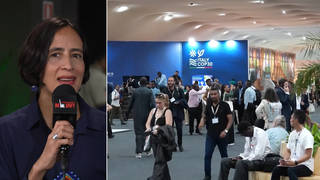
Guests
- Kim Barkerreporter for ProPublica. Her new investigation is called “How Nonprofits Spend Millions on Elections and Call it Public Welfare.”
As Democracy Now! has previously reported, one of every four dollars spent on the campaign ads, direct mail and robocalls that target voters now comes from so-called “dark money” organizations. The IRS lets these groups keep their donors secret because they are considered “social welfare non-profits.” But that changed this past Friday when a Montana judge ordered the release of one such group’s bank records. An investigation had found that Western Tradition Partnership may have misled the IRS about the extent of its political activities, and that citizens have a right to know where its campaign cash was coming from. The group is known for bringing a lawsuit to the Supreme Court that successfully challenged Montana’s ban on corporate spending in elections, and the resulting ruling extended the court’s Citizens United decision to include all 50 states. Friday’s ruling marks the first time a court has ordered a dark money group’s donors to be made public, and some say the judge’s move could serve as a warning to similar organizations. We’re joined by Kim Barker, the ProPublica reporter who helped break the story along with PBS Frontline. [includes rush transcript]
Transcript
AMY GOODMAN: We turn now to our last segment, a new investigation that tracks some of one—the $1 billion spent by outside organizations in this presidential election. As we’ve reported, one of every $4 spent on the campaign ads, direct mail, robocalls that target voters now comes from so-called “dark money” organizations. The IRS lets these groups keep their donors secret, because they’re considered social welfare nonprofits.
Well, that changed this past Friday when a Montana judge ordered the release of one such group’s bank records. An investigation has found that Western Tradition Partnership may have misled the IRS about the extent of its political activities, and that citizens have a right to know where its campaign cash was coming from. The group, which has since changed its name to American Tradition Partnership, is known for bringing a lawsuit to the Supreme Court that successfully challenged Montana’s ban on corporate spending in elections, and the resulting ruling extended the court’s Citizens United decision to include all 50 states. Friday’s ruling marks the first time a court has ordered a dark money group’s donors to be made public. Some say the judge’s move could serve as a warning to similar organizations.
For more, we’re joined by the ProPublica reporter who helped break the story. Kim Barker is author of an ongoing series of reports called “Campaign 2012: Revealing Dark Money and Big Data.” Her latest piece is called “Dark Money Group’s Donors Revealed.” She recently collaborated with PBS Frontline on a special report, “Big Sky, Big Money: A Tale of Money, Power and Political Intrigue in the Remote Epicenter of the Campaign Finance Debate: Montana.”
Kim Barker, welcome back to Democracy Now! Well, we don’t have much time.
KIM BARKER: Right.
AMY GOODMAN: And you have a lot to explain.
KIM BARKER: Right, exactly. Where do you want me to start?
AMY GOODMAN: Well, just explain what this group is, how the judge ruled, and what are the implications for this country.
KIM BARKER: Sure. Western Tradition Partnership is one of these social welfare nonprofits that are supposed to have social welfare or helping the community at large as their primary purpose. They are allowed to do some amount of politics, but it’s not supposed to be what they’re doing primarily. They were very involved in 2008 in the state elections in Montana. And after that, Montana investigators started an investigation and found, about two years ago, that this indeed was a political committee and that its donors should be public.
A lawsuit ensued, as it often does with this group. And for the last two years, it’s just been making its way through court. In the meantime, the group has—had brought a suit that went all the way to the Supreme Court, that, in effect, made Citizens United apply to all 50 states, so—and this happened this last June. So, it’s been a group that’s not very big, but it’s had a—it’s really punched above its weight in terms of its impact nationally.
What we did is we looked at all the documents that were available in Montana, including documents that had been found in a meth house in Colorado.
AMY GOODMAN: Excuse me?
KIM BARKER: A meth house in Colorado.
AMY GOODMAN: A…?
KIM BARKER: Meth house in Colorado. I mean, and I’m from Montana, so, you know, I was like, “Really? I’m doing a campaign finance story that leads back to a meth house?” But, yes, they were found there, by a man who is a convicted felon. He stumbled across these boxes in this meth house, and one name kept popping up in these boxes, which was Western Tradition Partnership.
AMY GOODMAN: How did these boxes end up in a meth house?
KIM BARKER: Well, we did not know. All we could find out at the time, before the story came out, was that he said that a friend of his had gotten him out of a stolen car and that they somehow ended up in this meth house. He was curious. He went through them. He kept seeing—you know, the group had been in the public domain. You know, there had been stories about them attacking candidates in Colorado, so he reached out to some candidates and their spouses. And one of them, a lawyer, actually, ended up going to pick up the boxes of documents.
And we’re talking about boxes and boxes of documents, mentioning candidates, having, you know, candidate draft material, campaign final drafts, you know, questionnaires of the candidates, and a lot of communication going back and forth between a man who was very involved with Western Tradition Partnership and the candidates. Now, that is one thing that is not allowed. I mean, everything seems to be allowed these days in terms of outside spending and candidates, but you are not allowed to coordinate.
AMY GOODMAN: And you write in your piece that some of the donors wrote notes on their checks, you now had a chance to see—
KIM BARKER: Right.
AMY GOODMAN: —that said things like…?
KIM BARKER: “Stop Obama,” you know, mentioning specific names of candidates they would like to support. And these were released separately. These were the documents that were released Friday by the judge.
AMY GOODMAN: And these donors were?
KIM BARKER: These donors—some of the donors were just small ma-and-pa organizations that clearly had gone to some sort of fundraiser. But then you had other social welfare nonprofits. And this is what you see a lot, and we’ve reported on this a lot, is that when you even get behind the veil of these groups, they’re getting a lot of their money from other social welfare nonprofits. It’s a way to sort of further obscure where the money comes from.
AMY GOODMAN: We’re going to link to your investigation at democracynow.org. Kim Barker, reporter for ProPublica, her new investigation called “How Nonprofits Spend Millions on Elections and Call It Public Welfare.”
And that does it for our show. Watch our special election broadcast tonight from 7:00 p.m. to 1:00 Eastern Standard Time. You can tune in on television, radio, watch live video stream at democracynow.org. Democracy Now! will be looking at claims of voter intimidation and harassment. If you have photos, video, we’ll be following the hashtag #dnvote, #dnvote. Check our website for details, democracynow.org.












Media Options